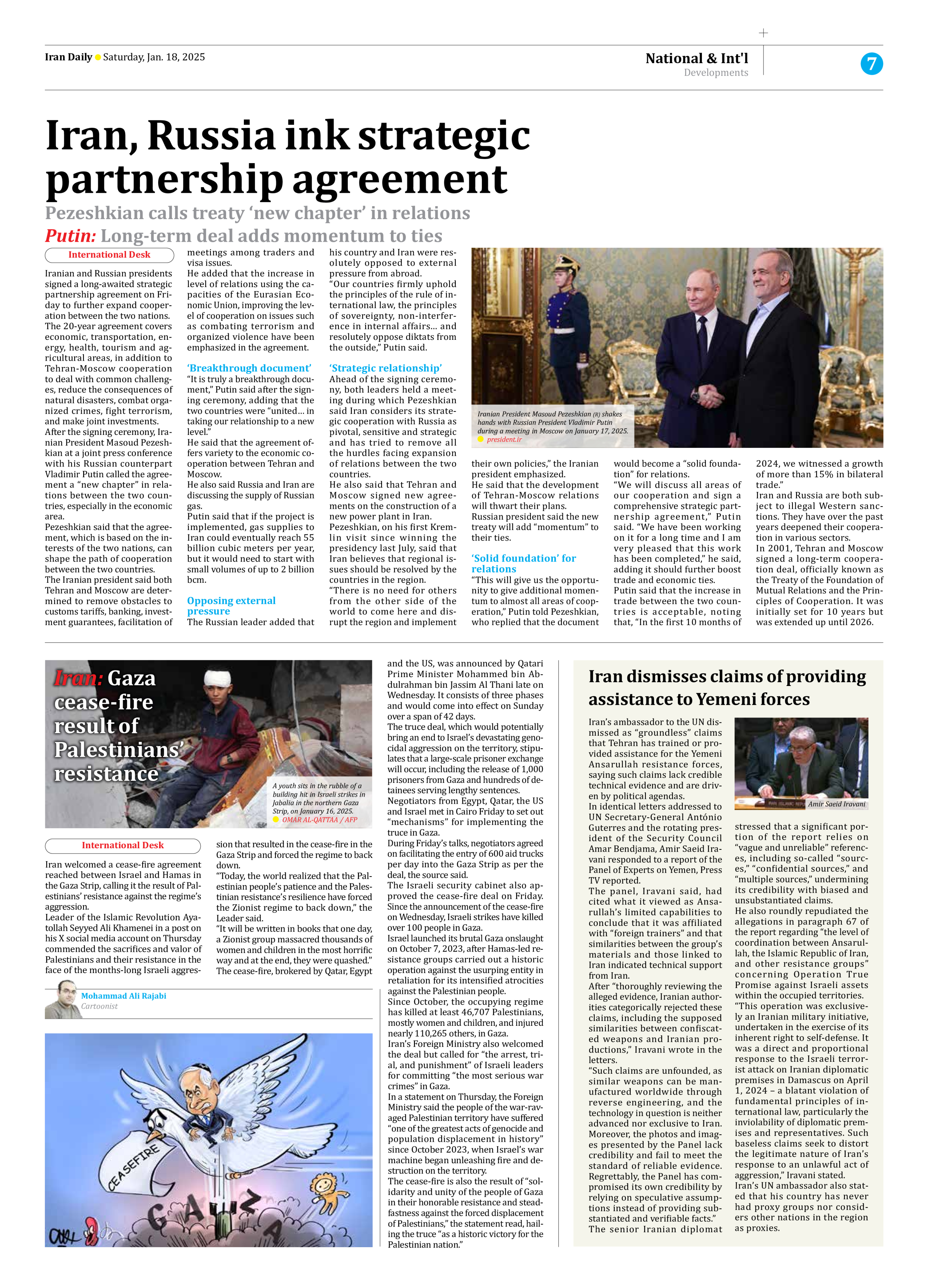
Iran, Russia ink strategic partnership agreement
Pezeshkian calls treaty ‘new chapter’ in relations Putin: Long-term deal adds momentum to ties
Iranian and Russian presidents signed a long-awaited strategic partnership agreement on Friday to further expand cooperation between the two nations.
The 20-year agreement covers economic, transportation, energy, health, tourism and agricultural areas, in addition to Tehran-Moscow cooperation to deal with common challenges, reduce the consequences of natural disasters, combat organized crimes, fight terrorism, and make joint investments.
After the signing ceremony, Iranian President Masoud Pezeshkian at a joint press conference with his Russian counterpart Vladimir Putin called the agreement a “new chapter” in relations between the two countries, especially in the economic area.
Pezeshkian said that the agreement, which is based on the interests of the two nations, can shape the path of cooperation between the two countries.
The Iranian president said both Tehran and Moscow are determined to remove obstacles to customs tariffs, banking, investment guarantees, facilitation of meetings among traders and visa issues.
He added that the increase in level of relations using the capacities of the Eurasian Economic Union, improving the level of cooperation on issues such as combating terrorism and organized violence have been emphasized in the agreement.
‘Breakthrough document’
“It is truly a breakthrough document,” Putin said after the signing ceremony, adding that the two countries were “united… in taking our relationship to a new level.”
He said that the agreement offers variety to the economic cooperation between Tehran and Moscow.
He also said Russia and Iran are discussing the supply of Russian gas.
Putin said that if the project is implemented, gas supplies to Iran could eventually reach 55 billion cubic meters per year, but it would need to start with small volumes of up to 2 billion bcm.
Opposing external pressure
The Russian leader added that his country and Iran were resolutely opposed to external pressure from abroad.
“Our countries firmly uphold the principles of the rule of international law, the principles of sovereignty, non-interference in internal affairs... and resolutely oppose diktats from the outside,” Putin said.
‘Strategic relationship’
Ahead of the signing ceremony, both leaders held a meeting during which Pezeshkian said Iran considers its strategic cooperation with Russia as pivotal, sensitive and strategic and has tried to remove all the hurdles facing expansion of relations between the two countries.
He also said that Tehran and Moscow signed new agreements on the construction of a new power plant in Iran.
Pezeshkian, on his first Kremlin visit since winning the presidency last July, said that Iran believes that regional issues should be resolved by the countries in the region.
“There is no need for others from the other side of the world to come here and disrupt the region and implement their own policies,” the Iranian president emphasized.
He said that the development of Tehran-Moscow relations will thwart their plans.
Russian president said the new treaty will add “momentum” to their ties.
‘Solid foundation’ for relations
“This will give us the opportunity to give additional momentum to almost all areas of cooperation,” Putin told Pezeshkian, who replied that the document would become a “solid foundation” for relations.
“We will discuss all areas of our cooperation and sign a comprehensive strategic partnership agreement,” Putin said. “We have been working on it for a long time and I am very pleased that this work has been completed,” he said, adding it should further boost trade and economic ties.
Putin said that the increase in trade between the two countries is acceptable, noting that, “In the first 10 months of 2024, we witnessed a growth of more than 15% in bilateral trade.”
Iran and Russia are both subject to illegal Western sanctions. They have over the past years deepened their cooperation in various sectors.
In 2001, Tehran and Moscow signed a long-term cooperation deal, officially known as the Treaty of the Foundation of Mutual Relations and the Principles of Cooperation. It was initially set for 10 years but was extended up until 2026.







